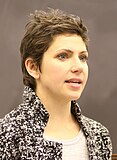As of 2024, the only city in the United States using a unified primary for government office is St. Louis.
St. Louis
The city of St. Louis has been using the unified primary since their mayoral election held in March 2021, having survived two repeal attempts. The voters of St. Louis will participate in a unified primary as part of the 2025 St. Louis mayoral election, since the constitutional amendment ("Amendment 7") passed in November 2024 exempts cities that had enacted reform prior to 2021 (and St. Louis enacted their unified primary in 2020). [10]
STL Approves
The STL Approves campaign sought to adopt the unified primary (though they refer to it simply as "approval voting") in St. Louis city elections (Mayor, Comptroller, President of the Board of Aldermen, and Alderman). [11] [12] [13] [14] Originally called St. Louisans for Ranked Choice Voting , [15] the campaign switched to advocating for approval+runoff, primarily due to learning that St. Louis and St. Louis County voting machines are incompatible with IRV. [16] [17] [18] [19] [20]
In April 2020 they gathered enough signatures to qualify for the ballot as "Proposition D". [21] [22] Polling showed more than 70% support for the measure, with majority support among all demographic groups and parties. [23] [24] On election day, the initiative was successfully passed with 68% of the vote, thus becoming the first United States city and jurisdiction to adopt it. [25] [26]
2021 election
The first top-two approval primary was held on March 2, 2021, with a 44,571 (22.14%) primary voter turnout. The April 6, 2021 runoff turnout was 57,918 (28.8%). [27] The 2021 St. Louis mayoral election had 4 candidates, three Democrats and one Republican. The average voter supported 1.56 candidates, with the top candidate gaining 57.0%, runner up 46.3%. [28]
In the old closed primary system, there would have been a Democratic party primary with 3 candidates, and a Republican party primary with 1 candidate, with the top Democrat and top Republican advancing to the general election. With Saint Louis being a Democrat-majority city, the top-two approval primary helps two Democrats rise and compete head-to-head in the runoff, as well as allowing Republican voters a say on which Democrat wins. Democrat candidates have some incentive to present themselves as a moderate to gain Republican votes. Without a party primary Republicans lose access to consolidate under a single candidates, so they must agree on a single candidate before the primary to have any chance of making the top-two.
2022 repeal attempt
While voter support for the approval voting ballot measure was high, a majority of the city's aldermen opposed it, and in January 2022, they attempted to repeal it and return to partisan primaries with two or three rounds of runoff voting. [30] [31] [32] Repealing a voter initiative requires a two-thirds majority of aldermen support, however, and the bills were not passed before another voter initiative, Proposition R, was passed with 69% support, which required that further changes to the voting system be put to a public vote. [33]






